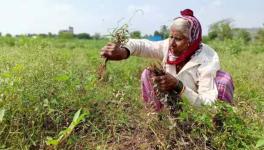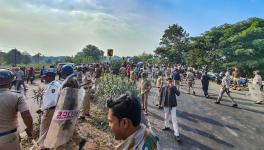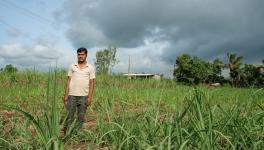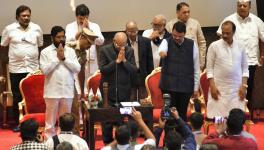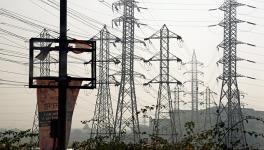‘The Rain Will Kill Us Before Corona’: Residents of Mumbai’s Ambedkarnagar Lament
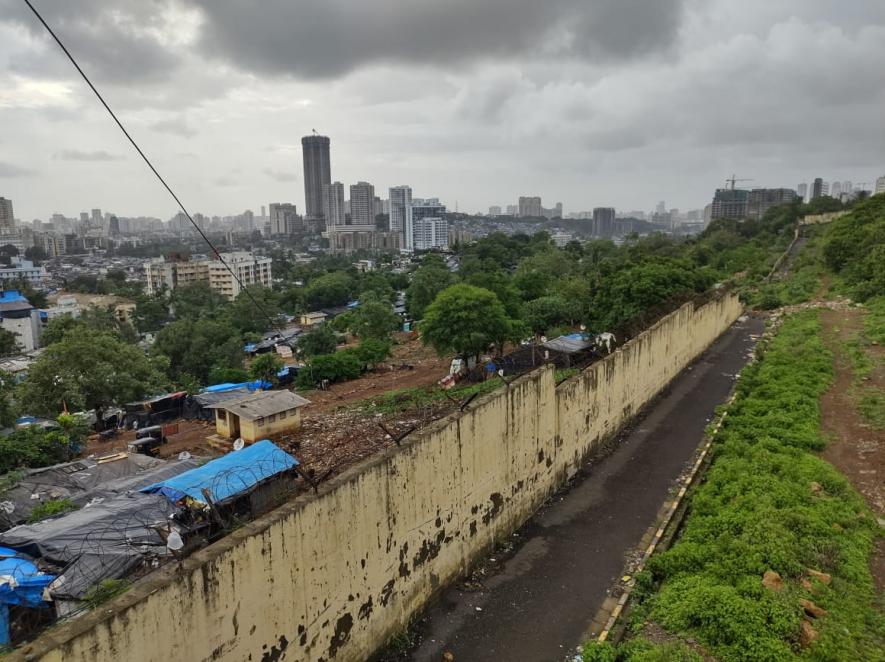
The stream that broke through the wall two years ago is unmissable when you enter Mumbai’s Ambedkarnagar. There’s garbage on both sides of the stream and a herd of pigs appear around it.
Located around 3 kms from Malad station and 1.5 kms from the nearest pucca road, reaching Ambedkarnagar is a trek across many streams of varying sizes and stenches. Ambedkarnagar and Pimpripada feel like villages unto themselves made up of small settlements. Ten-twelve huts built of bamboo, scrap, cardboard, etc. make up one settlement.
"The rain will kill us before corona," Govind Kadam's voice was filled with an impotent rage. He lives with his family in one of these huts and works as a security guard. "We can't care about corona, we don’t have a roof over our heads," he said.
On July 1, 2019, a wall on the hill slope fell due to the pressure of the water flow and 31 people lost their lives. Under mounting public pressure, the government had assured people of rehabilitation. Two years later, the people have still not been rehabilitated. With the onset of the monsoon, the people here count every day that they live.
"That night the wall on the hill collapsed, and all the water flew through our house. When Baba went to the backside of the house the next day, he saw a man’s leg. After clearing all the mud, an entire body emerged," Lucky Rana from Ahmednagar said laughingly. His 9 year-old self hadn’t processed the seriousness of the tragedy he had experienced. Recently enrolled in 4th standard, he was 7 years old when the Malad wall-collapse disaster occurred.
Also read: Dharavi and the Battle Against COVID-19 that Exposes the Fault Lines in our System
Navneet Rana, Lucky’s father, said, "He didn’t realise it was a body and we also chose not to tell him that it was a dead person. Since that day, Lucky cries whenever it rains heavily.” This is emblematic of the life of the children of Ambedkarnagar and Pimpripada situated in Malad East.
Riya Santosh Goregaonkar, another resident, talks about her daily trepidations, “The wall collapsed two years ago, but it hasn’t been rebuilt, so the downhill stream enters our home. If it rains a lot, our huts are washed away. On June 17, it rained heavily in the area and washed away many huts. People did not sleep for 2-3 days. Water seeped into the house and damaged everything. Food and clothes rot. It is impossible to predict when it will rain and when it will wash away our house, so we have to live with fear.”
Since this area is on the perimeter of the Sanjay Gandhi National Park, the Bombay Environment and Action Group had filed a PIL in the Mumbai High Court seeking protection of the park. Ruling on the petition, the Bombay High Court in 1997, directed the government to rehabilitate about 25,000 families living there within 18 months to protect the park and stop encroachment. Of these, 11,000 families were rehabilitated to Chandivali in 2005. The rest await rehabilitation, 24 years later.
In response to a public interest litigation filed in the Mumbai High Court by Ghar Bachao Ghar Banao Andolan (GBGB) an organisation fighting for the rehabilitation of these families, the government argued that it doesn’t have enough houses in Mumbai to rehabilitate the families. However, GBGB claims that the government is hiding data and that there are vacancies in many housing projects for the poor in Mumbai.
Also read: Mumbai Deluge: Of Heavy Rains and Climate Change
The annual floods of Mumbai injure this area the most as its land falls within the Forest Department's jurisdiction, and no new permanent structures can be built here. Consequently, unlike other slums, water and electricity isn’t supplied here. Water costs twice or thrice the normal amount. Electricity has a similar story, as it is procured illegally.
The Mumbai High Court had issued an order in 1997 to provide temporary arrangements in this regard. GBGB again approached the court in 2020 to ensure the provision of basic amenities like drinking water and toilets till rehabilitation is completed. There is only one toilet in the area, unserviceable. So, women and children defecate in the open.
A nala flows right next to the huts, so the area is a fiefdom of garbage and stench. Although the adults manage to find a way to survive, young children and the elderly suffer enormously. Not least due to the prevalence of contagious diseases. Jaundice and diarrhoea are endemic among children in this area. Pigs and snakes enter the huts in the rainy season as they live in the surrounding areas, a dangerous prospect for children, residents claim.
After the incident on July 1, 2019, about 85 families living in the area were immediately rehabilitated to Mahul. A Catch-22, if there ever was one.
Sanjay Vasant Rikame's family is one of the families rehabilitated in Mahul. He said, "We were shifted to Mahul 15-20 days after the July incident. The first time we were told that we were being moved to Mahul temporarily. After 3 months, you will be moved to a different place permanently. Two years later, we are still stuck in Mahul.”
When asked about the alarming air pollution levels at Mahul, he said, "Sir, there was no roof over my head. How could we care about the air quality? We got a house, we left."
Bilal Khan, from GBGB, is an activist fighting for the right to housing of the people of Mumbai since 2015. He said, “After the tragedy in 2019, the government could see the problem right in front of their eyes. They can see the condition of the people. But still, the government has no plan for these people. Even in court, they gave an incredulous argument that 'we don’t have houses'.”
Also read: River Beautification Project Could Heighten Flood Risk, Worry Pune Residents
He went on to add, “Let's assume that the government does not have houses now, but then why don’t they give these people basic amenities like temporary electricity and water! The government can’t abandon the people to fend for themselves. The security of the citizens is the responsibility of the government. But these are poor people, they are not a 'vote bank' so no one is bothered about their questions.”
Mumbai, like most cities, treats housing as a commodity. It has become impossible for working class people to own a house in Mumbai. A single bedroom house costs upwards of a crore. Rickshaw pullers, security guards, domestic workers, with a monthly income of Rs 18,000-20,000 can’t even dream of owning a house in Mumbai.
Even after a lifetime of labouring, slums are the only choice. They live in inhuman conditions, and the government treats these people as thieves, looters, 'encroachers', etc. Social prejudice and economic hardship forces these people to wait a lifetime, or more, to dream of justice.
Kiran Ashok Gupta lives with her family of four in a hut made of scrap. Originally from Ghazipur in Uttar Pradesh, she makes cheap jewellery and sews clothes for a living. Her husband works as a security guard. In the 2019 disaster, one side of her house was washed away.
She recalled the incident, "We went to bed at 10 p.m., the flood came at 1 a.m., and in a few minutes one side of our house was swept away. There was no light. My husband was yelling loudly but the rain was louder. When the water receded, two corpses floated into our house. The corpses lay in our house for three days. The police eventually came and removed the bodies. We stayed out of the house for three days.”
Kiran was unable to hold back her tears even after two years since the incident, as she said, "We don't need anything, we just want a house. To live here a single day during the rains is like living in hell.”
Get the latest reports & analysis with people's perspective on Protests, movements & deep analytical videos, discussions of the current affairs in your Telegram app. Subscribe to NewsClick's Telegram channel & get Real-Time updates on stories, as they get published on our website.












